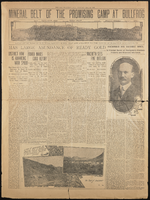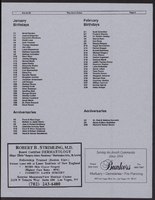Search the Special Collections and Archives Portal
Search Results

Nora Mirabal interview, August 30, 2019: transcript
Date
Archival Collection
Description
Interviewed by Elsa Lopez and Barbara Tabach. Cuban refugee family by way of Spain and then to the US; arrived in Las Vegas in 1973 when Nora was 9 years old. Struggled in youth but rises up as embraces educaton. Currently is Assistant Director of Academic Partnership at CSN.
Text

Transcript of interview with Ruth Annette Mills by Lisa Gioia-Acres, November 20, 2008
Date
Archival Collection
Description
Ruth Annette Mills was born and raised in Washington, D.C. She recalls the early years during WWII, her father's cancer and radium treatment under Blue Cross Blue Shield, his passing when she was nineteen, and her marriage that same year. Ruth and her husband and family lived in Georgia, Texas, and Maryland before coming to Las Vegas in 1968. She worked as a typist for the Office of Education at one point and did volunteer work for her church, the Cub Scouts, and the League of Women Voters. She also worked as a clerk-typist for the Clark County School District, and eventually became a teacher through the Teacher Corps program. She graduated in 1975 and was hired to teach 6th grade at CVT Gilbert. The school integration program was just beginning when Ruth was first hired as a teacher. She held the position of facilitator and recalls how angry parents were when they learned their children had to be bussed to sixth grade centers. Having been involved through her church with the Civil Rights Movement in other states, she was disappointed with the racist attitudes she encountered in Las Vegas. Ruth's involvement with health care began when her daughter-in-law developed kidney stones and was denied treatment. In 1993 she started the Nevada Health Care Reform Project through the League of Women Voters in order to support Bill Clinton's health plan. Fifteen years later, over 100 organizations had come on board to support the League's coalition in favor of Clinton's plan, and her fondest wish is that one day Universal Health Care will be available to all Americans.
Text

Transcript of interview with Christopher Maestas by Claytee White, September 14, 2008
Date
Archival Collection
Description
Christopher “Chris” Maestas (1965-2009) was an engaged educator and leader within the Chicano, Latinx, and Henderson communities. As he traced back his Latinx heritage, he explored his father’s hometown in Llaves, New Mexico, where he and his family were discriminated for their non-white demeanor; and his mother’s paternal Spanish roots; his grandfather came to work in Henderson, Nevada at the Basic Magnesium Industrial (BMI) plants during World War II. The Chicano and Spanish cultures played a significant part in defining his role within the community. For Chris, Chicanos were “people that lived in the southwestern United States particularly southern Colorado, New Mexico and northern Arizona that were originally Mexican citizens before the treaty (Treaty of Guadalupe Hidalgo) was signed and then after the treaty was signed they became Americans.” In this interview, he dives into the difference between Chicano and Spanish cuisine and gives his own tips on how to make Spanish chile relleno. Chris discussed what life was like in Henderson living in Henderson Camp when his grandfather emigrated from Spain in 1943. He described the evolution of the Henderson community in the 50s through his parents’ experiences living in the Hispanic communities of Victory Village and Carver Park. During his childhood in the early 70s, Chris recalled living in Henderson when it was known as Basic and living in a small town-site house. One of his most special recollections was from the summer of 1980, when his family purchased their first set of air-conditioning units. As a passionate teacher and 1984 alumnus from Basic High School, he advocated student engagement as Student Council Advisor. Chris was also an active member of the St. Peter the Apostle, Catholic Church, Knights of the Columbus group and LUPE (Latinos United for Perfect Equality) Club. The LUPE club promoted equality for the Hispanic community and family values. Chris described their Saturday picnics at BMI Park and the annual Henderson Industrial Days festival.
Text

Transcript of interview with Carl Ciliax by Gary Wood, March 8, 1980
Date
Archival Collection
Description
On March 8, 1980, Gary Wood interviewed Carl Ciliax (born 1941 in Las Vegas, Nevada) about his experiences living in Nevada. Ciliax first describes his family history, his early interests in wildlife, and his background and education in artwork. Ciliax then discusses his early experiences in hunting and his eventual interest in conservationism and preservation, including his involvement with organizations that sought the protection of desert bighorn sheep and the protection of wildlife in general. The two talk more about wildlife, the early development of Las Vegas, and the effects of the atomic testing. The interview concludes with Ciliax’s recollection of recreational activities and some of his thoughts on conservationism.
Text

Transcript of interview with Richard Erbe by Marcela Yepes, March 19, 1978
Date
Archival Collection
Description
On March 19, 1978, Marcela Yepes interviewed Richard Erbe (born 1922 in El Monte, California) about his experiences in Las Vegas, Nevada and specifically about his career in education. Erbe first talks about his family background and German ancestry before describing how he ended up moving to Nevada. He then describes his wife’s father’s background in the gaming industry and some of the early illicit casinos that existed in California. The interview shifts to Erbe’s educational background, his first teaching position as a fifth grade teacher, his experience in the military, and his reasoning for not seeking employment in the gaming industry. The two also discuss church activity, politics, and social activities in Las Vegas. The latter part of the interview includes Erbe’s viewpoints on the issues in the educational system, his experiences as a principal at multiple Clark County schools, and some of the challenges he encountered in the administrative side in the field of education.
Text

Transcript of interview with Lori Chenin-Frankl by Barbara Tabach, June 7, 2016
Date
Archival Collection
Description
Lori provides a wonderful narrative of her Judaism, her love of teaching children and her devotion to family and music. She talks about growing up in Las Vegas and becoming a bat mitzvah, a rarity for girls in 1973. Throughout her life, including the period where she moved around with her Air Force husband, she sought Jewish connections to help her feel at home no matter where she was.
Text

Abraham Gomez interview, December 6, 2019: transcript
Date
Archival Collection
Description
Interviewed by Elsa Lopez. Abraham Gomez is a College Navigator for the Nevada Treasurer's Office where he is responsible for providing and distributing information on post-secondary resources that may enable Nevadans to go to college. Gomez was born and raised in Las Vegas, Nevada and grew up on the East Side near Desert Pines High School. He received an Associate of Arts from the College of Southern Nevada before obtaining a bachelor's degree in Communication Studies from the University of Nevada, Reno. After graduating he worked as a GEAR UP Ambassador for Nevada State College where he advised a cohort of 46 low-income students on the importance of continuing their education. He has volunteered with various organizations throughout Southern Nevada and continues to work to better his community and make education accessible to students everywhere.
Text



